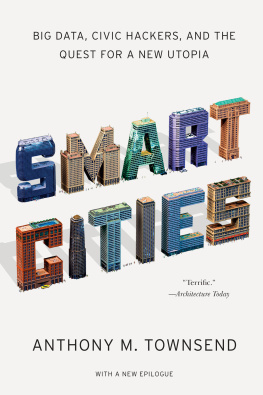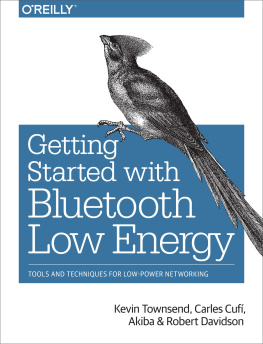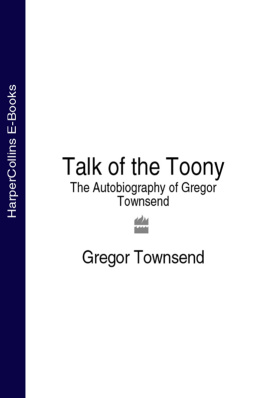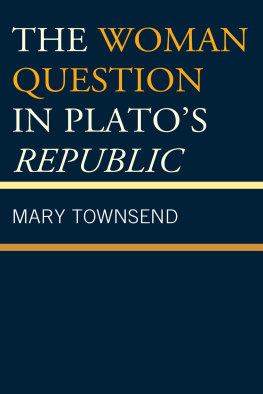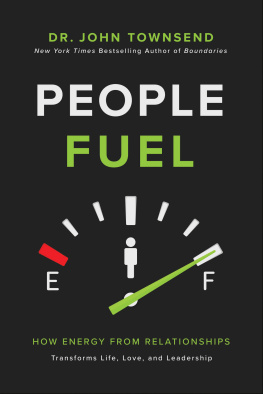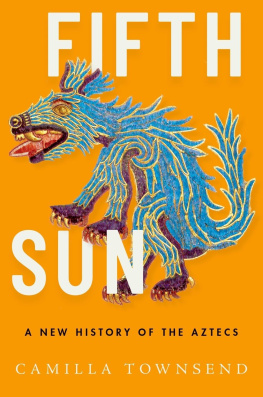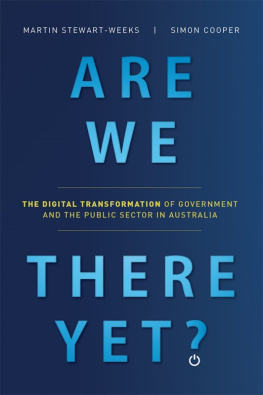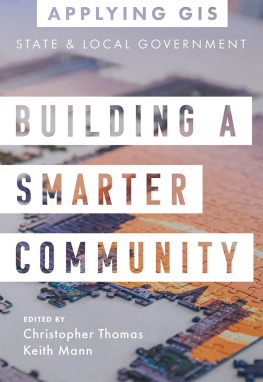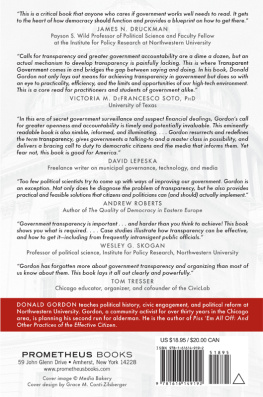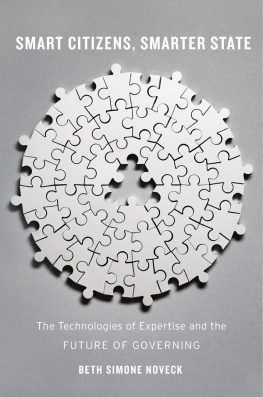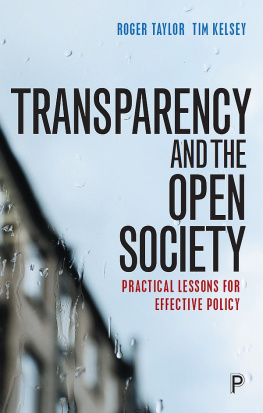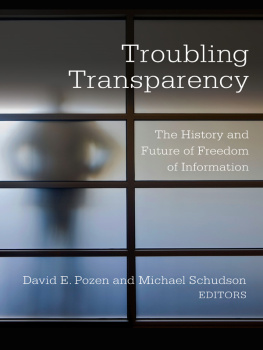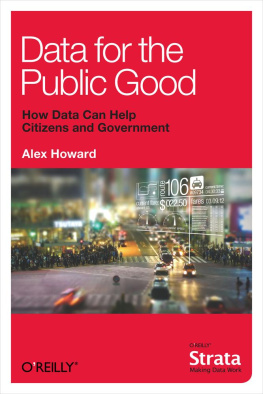

For Stella and Carter:
may you thrive in a better world.
What is the city but the people?
William Shakespeare, The Tragedy of Coriolanus
Contents
S troll through any neighborhood today and your body sets in motion machines of every kind. Approach a building and the front door slides open. Enter an empty room and a light flicks on. Jump up and down and a thermostat fires up the air conditioner to compensate for the warming air around you. Roam at will and motion-sensing surveillance cameras slowly turn to track you. Day after day, these automatic electromechanical laborers toil at dumb and dirty jobs once done by people. At the fringe of our awareness, they control the world around us. At times they even dare to control us. Yet they are now so familiar, so mundane, that we hardly notice.
But lately these dumb contraptions are getting a lot smarter. Hints of a newly sentient world lurk everywhere. A traffic signal sprouts a stubby antenna and takes its cue from a remote command center. The familiar dials of your electric meter have morphed into electronically rendered digits, its ancient gear works supplanted by a powerful microprocessor. Behind the lens of that surveillance camera lurks a ghost in the machine, an algorithm in the cloud analyzing its field of view for suspicious faces. But what you can see is just the tip of an iceberg. The world is being kitted out with gadgets like these, whose purpose is unclear to the untrained eye. With an unblinking stare, they sniff, scan, probe, and query.
The old city of concrete, glass, and steel now conceals a vast underworld of computers and software. Linked up via the Internet, these devices are being stitched together into a nervous system that supports the daily lives of billions in a world of huge and growing cities. Invisibly, they react to us, rearranging the material world in a flurry of communiqus. They dispatch packages, elevators, and ambulances. Yet, as hectic as this world of automation is becoming, it has a Zenlike quality too. Theres a strange new order. Everything from traffic to text messages seems to flow more smoothly, more effortlessly, more in control.
That machines now run the world on our behalf is not just a technological revolution. It is a historic shift in how we build and manage cities. Not since the laying of water mains, sewage pipes, subway tracks, telephone lines, and electrical cables over a century ago have we installed such a vast and versatile new infrastructure for controlling the physical world.
This digital upgrade to our built legacy is giving rise to a new kind of citya smart city. Smart cities are places where information technology is wielded to address problems old and new. In the past, buildings and infrastructure shunted the flow of people and goods in rigid, predetermined ways. But smart cities can adapt on the fly, by pulling readings from vast arrays of sensors, feeding that data into software that can see the big picture, and taking action. They optimize heating and cooling in buildings, balance the flow of electricity through the power grid, and keep transportation networks moving. Sometimes, these interventions on our behalf will go unnoticed by humans, behind the scenes within the wires and walls of the city. But at other times, theyll get right in our face, to help us solve our shared problems by urging each of us to make choices for the greater good of all. An alert might ask us to pull off the expressway to avert a jam, or turn down the air conditioner to avoid a blackout. All the while, they will maintain a vigilant watch over our health and safety, scanning for miscreants and microbes alike.
But the real killer app for smart cities new technologies is the survival of our species. The coming century of urbanization is humanitys last attempt to have our cake and eat it too, to double down on industrialization, by redesigning the operating system of the last century to cope with the challenges of the coming one. Thats why mayors across the globe are teaming up with the giants of the technology industry. These companiesIBM, Cisco, Siemens, among othershave crafted a seductive pitch. The same technology that fueled the expansion of global business over the last quarter-century can compute away local problems, they say. If we only let them reprogram our cities, they can make traffic a thing of the past. Let them replumb our infrastructure and they will efficiently convey water and power to our fingertips. Resource shortages and climate change dont have to mean cutting back. Smart cities can simply use technology to do more with less, and tame and green the chaos of booming cities.
Time will be the judge of these audacious promises. But you dont have to take it sitting down. Because this isnt the industrial revolution, its the information revolution. You are no longer just a cog in a vast machine. You are part of the mind of the smart city itself. And that gives you power to shape the future.
Look in your pocket. You already own a smart-city construction kit. The democratization of computing power that started with the PC in the 1970s and leaped onto the Internet in the 1990s is now spilling out into the streets. You are an unwitting agent in this historic migration. Stop for a second to behold the miracle of engineering that these hand-held, networked computers representthe typical CPU in a modern smartphone is ten times more powerful than the Cray-1 supercomputer installed at Los Alamos National Laboratory in 1976. Today, more than 50 percent of American mobile users own a smartphone.1 Countries all around the world have either already passed, or are fast approaching, the same tipping point.
We are witnessing the birth of a new civic movement, as the smartphone becomes a platform for reinventing cities from the bottom up. Every day, all across the globe, people are solving local problems using this increasingly cheap consumer technology. They are creating new apps that help us find our friends, find our way, get things done, or just have fun. And smartphones are just the startopen government data, open-source hardware, and free networks are powering designs for cities of the future that are far smarter than any industry mainframe. And so, just as corporate engineers fan out to redesign the innards of the worlds great cities, theyre finding a grassroots transformation already at work. People are building smart cities much as we built the Webone site, one app, and one click at a time.
I n 2008, our global civilization reached three historic thresholds.
The first came in February when United Nations demographers predicted that within the year, the millennia-long project of settling the planet would move into its final act. The world population will reach a landmark in 2008, they declared; for the first time in history the urban population will equal the rural population of the world.1 We would give up the farm for good, and become a mostly urban species.
For thousands of years, weve migrated to cities to connect. Cities accelerate time by compressing space, and let us do more with less of both. They are where jobs, wealth, and ideas are created. They exert a powerful gravitational pull on the young and the ambitious, and we are drawn to them by the millions, in search of opportunities to work, live, and socialize with each other. While in the end it took slightly longer than the original forecast, by the spring of 2009, most likely in one of Chinas booming coastal cities or the swelling slums of Africa, a young migrant from the hinterlands stepped off a train or a jitney and tipped the balance between town and country forever.2
Next page
